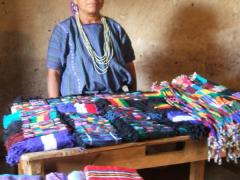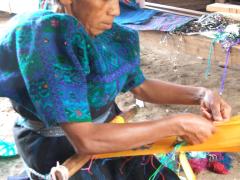Nancy's Second Day of Interviews
By nancy - Posted on July 22nd, 2007
Wednesday I headed up to San Antonio, Solola, Guatemala. It was the second day of volunteer work for Friendship Bridge and Kiva.org. My job was to interview four women and write about them and take photos which will be posted on the Kiva site so that people in the rich part of the world can make small loans to them via the Internet.
Patti (the Friendship facilitator) and I hopped into the taxi (really the back of a pickup). We snaked our way along the shore and up the side of a mountain -- the view was incredible. As I looked across the emerald lake toward the towering volcanoes, I wondered how such a beautiful place could house such incredible poverty.
All day I sat with the Mayan women in their homes, business and community center learning about their struggles, victories and dreams.
These people had been living in a war-torn area for twenty years only to be further pummeled by the incredible natural disaster Hurricane Stan in 2005. The torrential rains as a result of the hurricane washed away many communities. Whole neighborhoods no longer exist because of the mudslides that swallowed up the land the neighborhood sat on and with it thousands of people. It threw these people further into grave poverty.
Poverty is when people who have never had a day of schooling and have no resources to obtain the basics and no access to funds to take care of medical or dental emergencies then lose everything in a natural disaster. Some of the women have no shoes for themselves or their children. Most of the women I interviewed never went to school but know the value of schooling are struggling to figure out how to pay for their children's education. The children have to wear shoes to school and need notebooks and pens. Many families just cannot afford this and are lucky to be able to feed their children. Some do not have electricity or running water. Some have electricity to their house but no lights are on. Perhaps they can not afford light bulbs or the electricity or probably both. When the family has food shortages, this is poverty. When a person has a rotten tooth and it hurts and keeps them up all night and there is nothing they can do about it because there is no money for a dentist, I see this as poverty. The poverty in this town is great.
The women are survivors because they have no choice. They deal with what they are dealt. If they lose everything but the shirt on their backs, they sell that shirt so they can take care of their family. One woman did sell one of her two huipiles, her hand woven top, which cost over $100. It was all she had after the hurricane took everything, including her home.
Most of the women in the area make a living hand weaving traditional maya textitles which are turned into belts, scarfs, huipiles, pants, jackets, cloth bracelets, purses, table and bed covers. They can spend $10 in material, weave a product over the course of two weeks, and sell it for $40. They can only sell a few because the market is so flooded.
In order to weave they seek out loans to buy materials. Before the loans they could only afford material for one product, then wait until it sold and buy the material for the next. With the loans the women can buy enough material to make a few products and sell many more. At other times the loan may be used to send the children to school or just to buy food. The women repay the loan every month and usual pay off the few hundred dollars they borrow in six or nine months. Before microfinance there was little hope to crawling out of poverty, but at least now the families have some hope and room for dreams.
As I came home after the day of interviewing, the women’s stories, tears, smiles and laughter stuck deep in my soul. I will never be the same, I am so thankful for being able to have a day like this.
Randy and I will travel around Guatemala for at least another 10 weeks, interviewing the women thoughout this country and capturing a moment of their lives.
Patti (the Friendship facilitator) and I hopped into the taxi (really the back of a pickup). We snaked our way along the shore and up the side of a mountain -- the view was incredible. As I looked across the emerald lake toward the towering volcanoes, I wondered how such a beautiful place could house such incredible poverty.
All day I sat with the Mayan women in their homes, business and community center learning about their struggles, victories and dreams.
These people had been living in a war-torn area for twenty years only to be further pummeled by the incredible natural disaster Hurricane Stan in 2005. The torrential rains as a result of the hurricane washed away many communities. Whole neighborhoods no longer exist because of the mudslides that swallowed up the land the neighborhood sat on and with it thousands of people. It threw these people further into grave poverty.
Poverty is when people who have never had a day of schooling and have no resources to obtain the basics and no access to funds to take care of medical or dental emergencies then lose everything in a natural disaster. Some of the women have no shoes for themselves or their children. Most of the women I interviewed never went to school but know the value of schooling are struggling to figure out how to pay for their children's education. The children have to wear shoes to school and need notebooks and pens. Many families just cannot afford this and are lucky to be able to feed their children. Some do not have electricity or running water. Some have electricity to their house but no lights are on. Perhaps they can not afford light bulbs or the electricity or probably both. When the family has food shortages, this is poverty. When a person has a rotten tooth and it hurts and keeps them up all night and there is nothing they can do about it because there is no money for a dentist, I see this as poverty. The poverty in this town is great.
The women are survivors because they have no choice. They deal with what they are dealt. If they lose everything but the shirt on their backs, they sell that shirt so they can take care of their family. One woman did sell one of her two huipiles, her hand woven top, which cost over $100. It was all she had after the hurricane took everything, including her home.
Most of the women in the area make a living hand weaving traditional maya textitles which are turned into belts, scarfs, huipiles, pants, jackets, cloth bracelets, purses, table and bed covers. They can spend $10 in material, weave a product over the course of two weeks, and sell it for $40. They can only sell a few because the market is so flooded.
In order to weave they seek out loans to buy materials. Before the loans they could only afford material for one product, then wait until it sold and buy the material for the next. With the loans the women can buy enough material to make a few products and sell many more. At other times the loan may be used to send the children to school or just to buy food. The women repay the loan every month and usual pay off the few hundred dollars they borrow in six or nine months. Before microfinance there was little hope to crawling out of poverty, but at least now the families have some hope and room for dreams.
As I came home after the day of interviewing, the women’s stories, tears, smiles and laughter stuck deep in my soul. I will never be the same, I am so thankful for being able to have a day like this.
Randy and I will travel around Guatemala for at least another 10 weeks, interviewing the women thoughout this country and capturing a moment of their lives.


